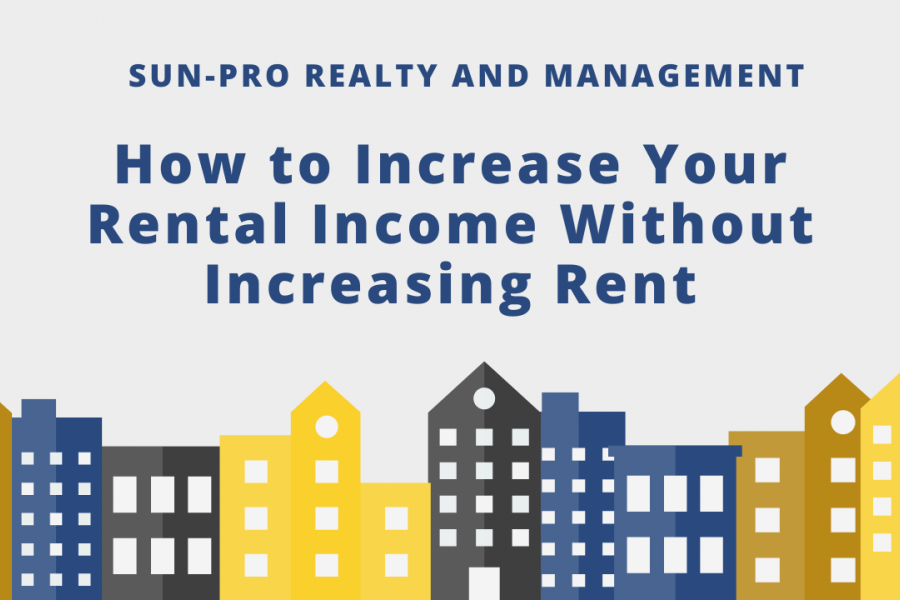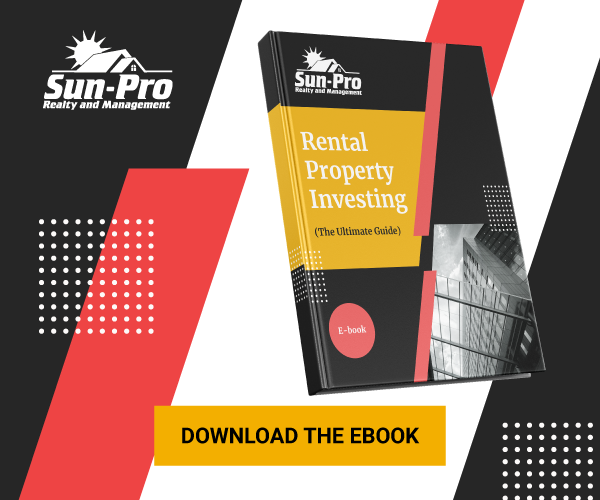
- Improve Property Maintenance and Curb Appeal
- Offer Additional Services or Amenities
- Reduce Vacancies Through Proactive Marketing and Tenant Retention Strategies
- Implement Energy-Efficient Upgrades to Reduce Utility Costs
- Utilize Technology For Cost-Effective Property Management
- Negotiate Lower Vendor Costs for Maintenance and Repairs
- Encourage Longer Lease Terms With Incentives for Renewal
- Implement Revenue-Generating Activities Like Laundry Facilities or Vending Machines
- Reduce Operational Expenses by Streamlining Processes and Reducing Waste
- Optimize Rent Collection Processes to Minimize Late Payments and Vacancies
- Conclusion
Maximizing rental income is a common goal for property owners and managers, but raising rents is not always the most viable or sustainable solution. At Sun-Pro Realty and Management, we understand the importance of maintaining a competitive edge while providing value to tenants.
In this article, we'll explore ten strategies that can help you increase your rental income without resorting to rent hikes.
Improve Property Maintenance and Curb Appeal
Regular property maintenance is crucial for preserving the value and attractiveness of your rental units. This includes tasks such as repainting walls, replacing worn flooring or fixtures, and addressing any necessary repairs promptly.
Enhancing the curb appeal through well-manicured landscaping, attractive exterior lighting, and a fresh coat of paint for the building's exterior can significantly boost the property's visual appeal. This helps reduce long-term maintenance costs by preventing minor issues from escalating into major repairs.
Offer Additional Services or Amenities
Providing value-added services or amenities can differentiate your rental property. For instance, offering amenities like secure covered parking, a fitness center, or a community clubhouse can make your property more desirable to potential tenants.
You could also consider providing additional services like valet trash pickup, package acceptance, or on-site laundry facilities for an added convenience fee. These extras not only enhance the overall living experience for tenants but also create opportunities for generating additional revenue streams beyond just rent payments.

However, it's essential to carefully evaluate the costs associated with implementing and maintaining these services or amenities to ensure they generate a positive return on investment.
Reduce Vacancies Through Proactive Marketing and Tenant Retention Strategies
Vacant units represent a significant loss of potential income, so it's crucial to minimize vacancies through effective marketing and tenant retention efforts. Implement advertising campaigns across various platforms, such as online listing sites, social media, and local publications, to attract potential tenants actively seeking rentals in your area.
Prioritize tenant satisfaction by promptly addressing maintenance requests and concerns, fostering open communication, and offering incentives like rent discounts or lease renewal bonuses to encourage existing tenants to renew their leases.
Implement Energy-Efficient Upgrades to Reduce Utility Costs
Energy-efficient upgrades can not only reduce your property's overall operating costs but also provide a selling point for environmentally conscious tenants. Consider implementing upgrades such as installing LED lighting, upgrading insulation, or investing in smart thermostats that can automatically adjust temperature settings based on occupancy.
These improvements can result in significant long-term savings on utility bills, which can translate into higher net income without directly increasing rents. Many states and municipalities also offer incentives or rebates for implementing energy-efficient upgrades, further offsetting the upfront costs.
Utilize Technology For Cost-Effective Property Management
Leveraging technology can streamline various aspects of property management, reducing overhead costs and increasing efficiency. Implement online rental applications and digital document management systems to minimize administrative burdens and paperwork.

Automate the rent collection processes through online portals or mobile apps, reducing the need for manual tracking and follow-ups. Consider incorporating smart home technology, such as keyless entry systems or automated temperature controls, which can enhance tenant convenience while reducing maintenance costs.
Negotiate Lower Vendor Costs for Maintenance and Repairs
Regularly reviewing and renegotiating contracts with service providers, such as plumbers, electricians, landscapers, and pest control companies, can help reduce your maintenance and repair costs. Establish long-term relationships with reliable vendors, as they may be more willing to offer discounted rates or package deals for consistent business.
Consider bundling multiple services with a single vendor or negotiating bulk pricing for larger properties or portfolios. Actively seeking out cost-saving opportunities with vendors helps minimize expenses without compromising the quality of maintenance and repairs.
Encourage Longer Lease Terms With Incentives for Renewal
Longer lease terms can provide stability and reduce tenant turnover costs, ultimately contributing to increased rental income. Consider offering incentives, such as a discounted monthly rate or a rent-free period, to encourage tenants to sign longer leases or renew their existing contracts.
This approach not only minimizes vacancies but also ensures a steady stream of rental income over an extended period. Longer lease terms can also reduce the administrative burden and costs associated with frequent tenant turnover, such as advertising, screening, and unit preparation expenses.
Implement Revenue-Generating Activities Like Laundry Facilities or Vending Machines
If your rental property has common areas or amenities, consider installing revenue-generating amenities such as coin-operated laundry facilities or vending machines. These passive income streams can contribute to your overall rental income without directly impacting tenant rents.

However, it's essential to ensure that these amenities are well-maintained and conveniently located to maximize their usage and profitability. You may also need to obtain necessary permits or licenses and comply with local regulations regarding the installation and operation of such facilities.
Reduce Operational Expenses by Streamlining Processes and Reducing Waste
Regularly evaluating and optimizing your operational processes can help identify areas where inefficiencies or waste can be minimized, ultimately reducing expenses. This could involve automating repetitive tasks, implementing paperless systems, or optimizing resource usage, such as water or electricity conservation measures.
Implementing recycling and waste reduction initiatives can contribute to cost savings while promoting environmental sustainability. By continuously seeking opportunities to streamline processes and reduce waste, you can minimize unnecessary expenses, thereby increasing your net rental income without raising rents.
Optimize Rent Collection Processes to Minimize Late Payments and Vacancies
Implementing efficient rent collection processes can help reduce late payments and minimize the risk of vacancies due to non-payment. Consider offering online or automatic rent payment options, which can streamline the collection process and reduce administrative tasks.

Establish clear policies for late fees and enforce them consistently to incentivize timely payments. Foster open communication with tenants regarding payment plans or financial hardships, as working collaboratively can often lead to better outcomes than pursuing evictions or legal actions.
Conclusion
At Sun-Pro Realty and Management, we understand the challenges property owners and managers face in maximizing rental income while maintaining a competitive edge. By implementing these ten strategies, you can increase your profitability without resorting to rent hikes, which can potentially lead to tenant dissatisfaction and high turnover rates.
Our team of experienced professionals is dedicated to helping you achieve your goals through tailored property management solutions. Contact Sun-Pro Realty and Management today to schedule a consultation and learn how we can help you unlock the full potential of your rental property portfolio.
